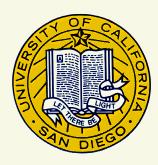Reminder: Signature lead time and contact information
1. What's Kim Barrett's contact information?
Everything you need to know is on this page, but here it is again. Kim E. Barrett, Dean of Graduate Studies. 9500 Gilman Drive, La Jolla, CA 92093-0003. (858) 534-6655. fax: (858) 534-4304. email: graduatedean (at) ucsd (dot) edu. (Don't actually spell it out like that, obviously.) All requests for signatures go to me. If I'm not here, you can leave it with the OGS receptionist and I will get it and contact you when it's ready for pick-up. Please don't contact Dr. Barrett or her assistant Glenda Wheeler directly--they will just refer you to me, anyway.
2. Who sends my application?
Graduate students are responsible for sending all parts of their applications.
3. (For graduate coordinators) What's a grant? What's a fellowship?
A grant is any award where a faculty member applies for a sum of money which he/she might then distribute to students. If a graduate student applies directly, it's usually a graduate fellowship. Grants go through your usual process, involving Research or OCGA. Graduate fellowships are signed off on directly by Kim Barrett through the process I just described. One big exception to this rule is the NSF Dissertation Improvement Grants. Professors apply for those on behalf of students, even though the students are the primary recipients of the money. Students should keep this in mind when applying for NSF awards: OCGA can take a considerable amount of time to process applications, and they have their own rules and paperwork, which professors who have applied for grants before can help with.
4. What do you need to have Kim Barrett sign off?
Usually I just need the cover page and any budget information you might disclose with your application. All other signatures need to be in place before Dr. Barrett can sign. This is university policy, and I can't be flexible about it.
5. When do you need everything?
We ask for at least 10 business days. This is not because it usually takes us 10 business days (which I think would officially constitute the world's longest signature) but because the life of the Dean of Graduate Studies is a busy one and Dr. Barrett is often out of the office, advocating for UCSD's graduate students in various fora and trying to keep up her own lab and connections with the academic side of the university. If you leave it to the last minute, there's no guarantee she'll be in the office to sign.
6. Can't you just stamp it?
In many cases, no. Look carefully at your face page. Does it say something about "no per signature"? That means that it can't be stamped. This appears on most NIH documents, for instance.
It's important to the university that you apply for fellowships and we try to be as flexible as we possibly can about last-minute situations and problems, but there's a limit to what we can do about very late submissions. Save yourself the heartache of filling out an entire application only to find that there's no one to sign off on it by getting your facepages to me as soon as possible. I require only the facepage and budget to allow you the maximum amount of time to work on the actual proposal part of the application. As long as you and your advisor are willing to sign off on the science, we'll sign off on the administrative portion.
With the holiday and the university closure approaching, turn in your applications due in the first part of January no later than this Friday, Dec. 21, for prompt processing.

